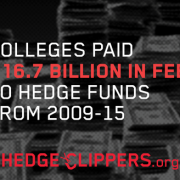Not very, especially at higher-end schools. Read David Leonhardt’s commentary at The New York Times.
| A lack of diversity. Regular readers know that socioeconomic diversity on college campuses is an obsession of mine. A lot of colleges, public and private, like to think of their campuses as highly diverse. And they are diverse racially, religiously and geographically. But many of them remain dominated by affluent students. |
| One twist on this problem is the embarrassingly small number of military veterans at many top colleges. “Veterans,” says Catharine Bond Hill, the former president of Vassar, who now runs Ithaka S+R, a research group, “are underrepresented at the set of schools with the highest graduation rates and the most resources.” Some top colleges enroll fewer than five veterans a year. My colleague Frank Bruni listed some of the miserable numbers in a 2016 column. |
| But now there are at least some small signs of progress. I attended a conference at Arlington National Cemetery yesterday where several colleges promised to increase veteran enrollment. |
| Cornell, which now has about 40 veterans among its undergraduates, plans to raise that number to 100 by 2020, for example. Indiana University, the University of Michigan and Muhlenberg College in Pennsylvania also said they would increase their numbers. And the College Board announced it would make it easier for colleges to identify veterans with solid standardized-test scores. |
| Right now, many colleges aren’t even trying to recruit veterans. Among the colleges that recruit on military bases, “You don’t see Cornell. You don’t see the University of Maryland,” Piragash Swargaloganathan, a Navy veteran and recent Cornell graduate, told me at the conference. “It’s mostly online schools and for-profit schools.” (And many online and for-profit colleges have terrible records.) |
| The good news is that the veterans who do enroll in strong four-year colleges tend to do very well. They have higher grades and graduation rates than average. Recruiting more veterans to these colleges, as Hill says, will help the veterans, the colleges and ultimately the country. |



